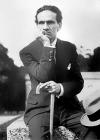Bibliography
Los Heraldos Negros (The Black Messengers) was completed in 1918, but not published until 1919. Robert Bly, in the 1993 edited volume Neruda and Vallejo: Selected Poems, describes it as "a staggering book, sensual, prophetic, affectionate, wild," and as "the greatest single collection of poems I have ever read." The title is likely suggestive of the four horsemen of the apocalypse, as the book itself touches on topics of religiosity, life and death. Trilce, published in 1922, anticipated much of the avant-garde movement that would develop in the 1920s and 1930s. Vallejo's book takes language to a radical extreme, inventing words, stretching syntax, using automatic writing and other techniques now known as "surrealist" (though he did this before the Surrealist movement began). The book put Latin America at the center of the Avant-garde. Like James Joyce's Finnegans Wake, Trilce borders on inaccessibility. In España, aparta de mí este cáliz (Spain, Take This Chalice from Me), Vallejo takes the Spanish Civil War (1936–39) as a living representation of a struggle between good and evil forces, where he advocates for the triumph of mankind symbolised in the salvation of the Second Spanish Republic (1931–39) that was being attacked by fascist allied forces led by General Franco. In 1994 Harold Bloom included España, Aparta de Mí Este Cáliz in his list of influential works of the Western Canon. Poemas Humanos (Human Poems), published by the poet's wife after his death, is a leftist work of political, socially oriented poetry. Although a few of these poems appeared in magazines during Vallejo's lifetime, almost all of them were published posthumously. The poet never specified a title for this grouping, but while reading his body of work his widow found that he had planned a book of "human poems", which is why his editors decided on this title. Of this the poet's last written work, it was said"... after a long silence, as if the presentiment of death might have urged him, he wrote in a few months the Poemas humanos."






